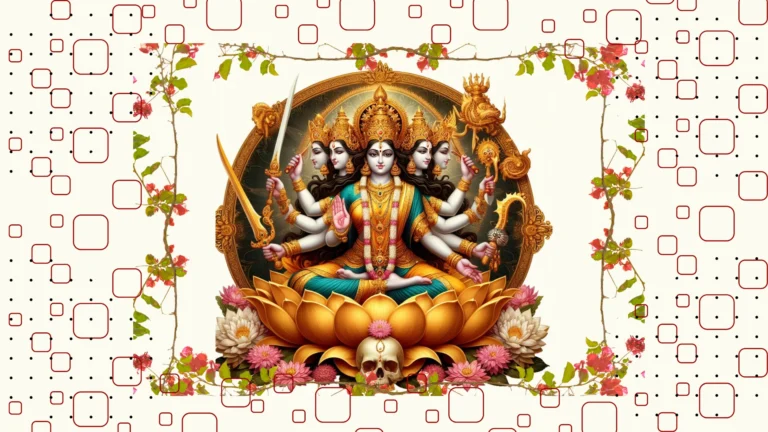Table of Contents
Success in performing actions or gaining knowledge on the path to abandon depends completely on the supporting practices, also known as renunciation practices, that you need to follow while you’re on the journey.
If one does not follow the precepts of spirituality with devotion, they completely render the precepts ineffective, even if one performs them.
This topic addresses the necessity of observing the six stages of renunciation.
They are:
(1) Total renunciation of forbidden actions.
(2) Renunciation of actions motivated by desire.
(3) Complete renunciation of thirst for worldly objects.
(4) Renunciation of the practice of accepting services from others for selfish motives.
(5) Absolute renunciation of indolence and the desire for fruits concerning one’s duties.
(6) Complete renunciation of the sense of mine and thine.
(1) Complete renunciation of prohibited actions

One should completely abstain from shameful actions in thought, word, and deed; actions forbidden in the Vedic scriptures such as theft, adultery, cheating, spreading lies, greed, duplicity, taking forbidden food, coercion and violence.
(2) Renunciation of actions motivated by desire

One should stop performing actions with selfish intentions. Engaging in sacrifices, Vedic rituals, worship, penance, charity, etc., solely for fulfilling personal desires like acquiring a spouse, offspring, wealth, or easing suffering or overcoming obstacles. This self-centered mindset towards spiritual practices signifies the second phase of renunciation, marked by a deficiency of genuine devotion and sincerity. It is crucial to nurture a selfless mind.
8 Questions from Sanatana Dharma
The scores generated in this Quiz are absolute. There are right or wrong answers to each Question. A percentage towards 100 indicates that you are more aligned to the overall subject matter.
(3) Complete renunciation of thirst for worldly objects

One should give up the thirst for the increase of one’s own honor, fame, social prestige in order to increase other objects that are transient by nature. One must consider pursuit of things such as wealth, fame, position or possessions an obstacle on the path to God-realization. This summarizes the third stage of renunciation.
(4) Renunciation of the practice of accepting services from others for selfish motives
Requesting bodily services from others for one’s own sense gratification and accepting bodily services offered without asking, or trying to achieve one’s selfish goal through anyone by using any means, all come under the heading of accepting services from others for selfish motives.

A person is in the fourth stage of Renunciation when he is free of all these tendencies.
If not accepting a physical service from another or monetary benefits, etc, offered by another causing the other pain, is sinful. This offering should not fall under the category of bribing in any manner, though.
If one accepts a service or offer, by causing some discomfort or pain to someone such that the giver loses peace with sorrow in the heart, that act becomes sinful.
Accepting a service under circumstances in a selfless spirit only for the pleasure of those who offer it would not be blameworthy.
(5) Absolute renunciation of indolence and fruit-seeking in relation to all one’s own duties
Man must fulfill his basic duties such as Devotion to God, worship and service to the deities, service to parents, responsibility to the family, performance of penances, charity, earning a livelihood commensurate with one’s rank in society, bodily functions, taking care of oneself, eating and drinking properly, and so on, which he should not compromise with. Renunciation of sloth and all forms of desire in relation to these duties is the fifth stage of renunciation.
(6) Complete renunciation of the sense of mine and thine
A man must realize the transitory nature of all worldly objects, name, fame, wealth, position, property, family, work and all forms of enjoyment in the world. When one has developed one-pointed attachment to God, love for God, one should stop harboring within oneself the sense of “mine” and “thine” in relation to the actions of mind, speech and body. This is the sixth degree or stage of renunciation. When one has reached the sixth degree, one should develop absolute indifference to all objects of the world.

One should by now have considered, accepted and realized God as the only object of one’s concern and love. At this stage of renunciation, one should automatically hear, speak and mentally dwell only on the thoughts of God, stories of His immaculate divine love revealing His virtues, glory, mystery and grace. Pondering over the hidden meanings of the Vedic scriptures while continuing to live in a secluded place should be the favorite pastime of the man who has attained the sixth renunciation.
Such people do not want to talk about the world, worldly people, or even for a single moment of pleasure, merriment, carelessness, denigration of others, sensual pleasure, gossip, and so on. The principal occupation of people who are in this state of renunciation should be to dwell on the Holy Name and the form of the Supreme Being. This stage of maturity also falls into the category of exclusive karma yoga.
The message of the Gita speaks to every soul, every living being. When one studies the Gita, it describes three different paths, namely Karma Yoga, Jnana Yoga, and Bhakti Yoga.
How does one follow the different paths of yoga?
Although they appear to be three different paths, all three paths overlap. There are shades of different aspects of yoga that form a pinnacle between the three primary forms of yoga. It is simply not possible to follow one particular form of yoga if you stick to the classical definitions.

We need to understand that yoga in this context is a combination of everything, karma, jnana and bhakti. If we follow only one path and neglect the others, then we develop an incomplete understanding. To fully realize one path, we must absorb all three forms of yoga. Once we do that, we realize everything.
One follows shades of the other forms of yoga, even if one focuses mainly on a primary yogic practice.
Now we shall discuss Karma that leads us to such a life of authentic renunciation.
When can we feel Karma strongly?
Life programs us automatically in the early stages of coping with life, most of life is automatic. Our pent-up tendencies control our life by deniable hypocrisy. This means that there is no order in our lives. Life goes round in circles, in the same whining mode.
Karma, a series of automatic actions and results controls everything. Nature directs it. Here everything is “karma” without the yoga. As long as there are no life situations that get out of hand, one is happy to live through life randomly and cyclically. So sometimes there are situations in which the challenges are so great that they act as a wake-up call for us.
How does Karma become Karma yoga?
This call begs for our attention. It calls for conscious effort, for action, for karma. So when we shed our evil tendencies and adopt the right mindset to perform an action, that is called karma yoga. Karma with an additional word, yoga. Karma yoga simply means that we drop our expectations that build up through unconscious brooding.

Once we look at things from the light of consciousness, the action (karma) we perform becomes pure. It can then become a means to attain moksha.
Put, when one practices yoga (austerity, i.e. conscious effort), it becomes karma yoga.
When man acts consciously, when there is some kind of understanding that there is a higher cause for everything that happens, yoga shall enter man’s life. This is when man develops a deep interest in the laws of karma. He is more interested in looking at the chain of cause and effect as one progresses in life.
If one undertakes a deeper study of karma, one also realizes that the chain of karma comes into play regardless of the conscious effort to deal with things.
He realizes it is life that brings a person into a situation. Life allows people to have experiences that can either be very pleasant or sometimes completely devastating. At this moment, the person considers the possibilities of working through karma through a scientific approach, whereby one can ease the karmic “accidents”.
This is where the Bhagavad Gita comes to the rescue. All Vedic scriptures point to this that karma can be consciously burnt and also transformed into something fruitful and pleasant.
Effects of Karma on the ego
Although we cannot control Karma it alters, its quality and effect so much that karma never appears as a punishment. The book of the secrets of karma is indisputably the Srimad Bhagavad Gita.
“When Karma acts from a place where ego does not exist , the results of karma do not hurt,” the Gita admonishes. We are all hurt by karma because it connects with us through the inner hard shell of the ego. When karma attacks, it attacks our false self. Spirituality calls this the ‘ego’
The ego is a conglomeration of thoughts, emotions and concocted value systems that we unconsciously build up in this life, as well as those we have built up in previous lives. Karma and its consequences, when directed at this hard shell of the ego, cause pain. Even ego apparently inflates joy.

Therefore, an ordinary situation can seem pleasant to some people. This is because the false self is hard and manipulates the situation to cause heightened effects of pain or pleasure.
The Gita advises us to accept karma, but to direct it towards another universal entity, which is our true self. Some refer to this true self as our Higher Self. Others call it the Supreme Being or the Lord. When one learns to distance oneself from the karmic fruits or take any credit for karma, one successfully deflects the painful missile of karmic law.
Kindly Whatsapp me on 7417238880 for free consultations on your problems. We can also discuss about suitable Yantras to improve life situations. |




